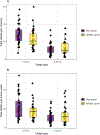Past and future episodic detail retrieval is reduced among clinically normal older adults at higher genetic risk for late-onset Alzheimer's disease
- PMID: 36442007
- PMCID: PMC10129290
- DOI: 10.1037/neu0000866
Past and future episodic detail retrieval is reduced among clinically normal older adults at higher genetic risk for late-onset Alzheimer's disease
Abstract
Objective: Remembering and imagining personal events that are rich in episodic (i.e., event-specific) detail is compromised in older adults who have mild cognitive impairment, a known risk factor for Alzheimer's disease dementia. Less clear is whether lower episodic detail generation is associated with higher risk for Alzheimer's disease dementia before mild clinical decline is detectable.
Method: We compared past and future autobiographical thinking in clinically normal older adult carriers of the Alzheimer's disease-associated apolipoprotein E e4 allele (APOE4; n = 39) to demographically and neuropsychologically similar non-APOE4 carriers (n = 43).
Results: APOE4 carriers showed a significant reduction for episodic details when remembering past events (d = .47) and imagining future events (d = .46), but not for nonepisodic details.
Conclusions: These findings suggest that APOE4 is associated with a selective reduction of episodic detail during past and future autobiographical thinking among clinically normal older adults. Reduced episodic detail generation, therefore, may be an early cognitive associate of higher risk for Alzheimer's disease dementia. (PsycInfo Database Record (c) 2023 APA, all rights reserved).
Conflict of interest statement
Declaration of interests: none
Figures


References
-
- Addis DR (2018). Are episodic memories special? On the sameness of remembered and imagined event simulation. Journal of the Royal Society of New Zealand, 48(2), 1–25.
-
- Addis DR (2020). Mental time travel? A neurocognitive model of event simulation. Review of Philosophy and Psychology, 11, 233–259. 10.1007/s13164-020-00470-0 - DOI
MeSH terms
Substances
Grants and funding
LinkOut - more resources
Full Text Sources
Medical
Miscellaneous

